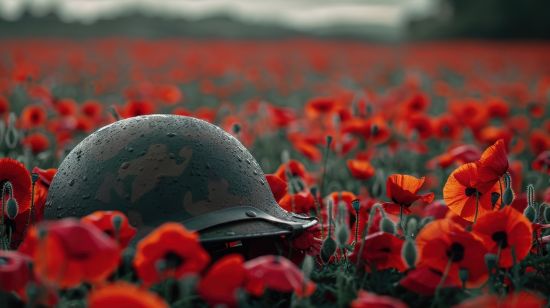Having crawled out from under a blanket after a week of having a significant respiratory infection, I am back to writing this blog. If you missed the daily postings and thought something was wrong with your notifications, not so. The problem was in my head and my chest and did a number on the rest of my body. I’m starting to recover but I still have some nasty wheezing and coughing episodes. But enough about me.
Today is Remembrance Day in my country. In other places, it goes by different names. In France and Belgium, it is Armistice Day because this calendar date marks the signing of the end of hostilities on the Western Front in World War 1, the eleventh hour of the eleventh day of the eleventh month. The Americans call it Veterans Day to memorialize all who have served in their armed forces.
In Canada, the day is marked by the wearing of a symbolic red poppy flower, a reference to a poem by a Canadian, Dr. John McCrae who wrote “In Flanders Fields” after witnessing the death of a friend in the Second Battle of Ypres on May 3, 1915. McCrae’s poem was published later in Britain’s Punch magazine in December of that year and became the most commonly quoted writing from the War. McCrae died from pneumonia in 1918 while still serving in the war to end all wars.
Considering the many wars currently being fought around the world, it would be good for all those leading us into unnecessary battles and those who follow willingly to remember the significance of a day so many hoped would end war permanently. War, however, remains with us well into the 21st century. In the past, we have fought wars that have gone on for decades and even one that lasted longer than a century.
The most destructive war in the history of our species, World War 2, killed 3.7% of the world’s population at the time and started as a conflict for ideological supremacy and world domination. Fascism in Europe aligned with Japanese militarism against Communist Russia and a coalition of Western Democracies. The atomic bomb was an invention of that conflict and with sabre-rattling from Russia’s leadership in the current Ukraine conflict, the threat of atomic weapons use grows greater. Atomic weapons would kill far more than 3.7% of the planet’s human population should a new world war erupt.
Why do humans go to war?
Anthropologists look at the fossil record for signs of human-to-human conflict in our past. They have found ample examples some dating back tens of thousands of years. It appears, therefore, that organized interspecies violence is as old as our species itself.
We don’t have to look too far to see manifestations of this primitive behaviour when we watch our closest primate relative, the chimpanzees who in the wild make war upon each other. Those who see our war-making behaviour in this light point to war as being in our genes, that what may have been a survival adaptation benefit has left us with a propensity for intergroup conflict. Other anthropologists and human behaviourists see war as an invention rather than a biological necessity with no genetic evidence to support the theory.
Nevertheless, with or without genetic evidence, we humans fight about anything and everything. We fight about religion. We fight because of ideological differences. We fight over resources. We fight for revenge. We fight on land, on water in the air, and probably soon in space.
Often the participants in these conflicts have very different perspectives about why they fight. Here are two good examples, one historic, the other contemporary:
- The Vietnam War was seen by the United States as a war to stop the advancement of Communism in Asia. “Falling Dominoes” was a theory of the 1950s in Western and democratic countries that referred to nations going “red” with the march of Communism across Asia from Russia to China and further south. The theorists saw Vietnam as the last bastion against this inevitability. The Vietnamese however, saw the war in a far different light. It was a fight for independence, for colonial liberation from the French and then the Americans who replaced them.
- The Israel-Arab wars have persisted for more than 75 years with opponents seeing these conflicts through very different lenses. From some Israeli’s perspectives, these wars have been about keeping an ancient covenant dating back thousands of years. For other Israelis, the wars are about the survival of Jewry in a post-Holocaust world and the preservation of a nation founded by Jews for Jews. Some of Israel’s Arab neighbours, however, see the conflict resulting from an intrusion into their world by British and European colonialists and the continuation of 19th-century imperialist practices in the Middle East. Others see Israel as the place where Europe’s post-Holocaust guilt has been manifested upon them creating a state for survivors of a crime that didn’t involve the Arabs. Then again, other Arabs see Israel as colonialism reborn through Zionism, a 19th-century Jewish national movement. And finally, there are Arabs who see Israel’s ongoing existence as a religious and ideological conflict involving Islam, Judaism, Christianity and the Atheist West.
On this Remembrance Day, maybe, there is still hope for us, that we can adopt French philosopher Jean-Jacques Rousseau’s outlook about ourselves as a species naturally peaceful, and warfare as an aberration running counter to who we were before “civilization” corrupted us. A bit wistful as this may be, there remains one certainty about war. The conflicts in our past need to form the lessons of what not to do for those who follow us in the future.









